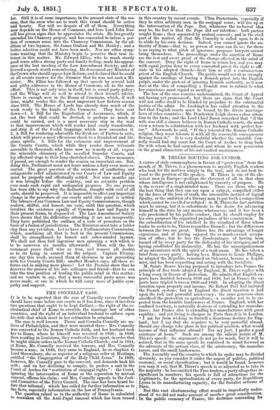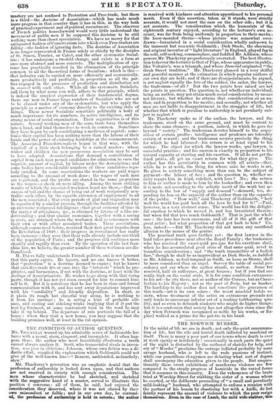M. TRIERS TOUTING FOR CUSTOM.
A CENTO of stale commonplaces in favour of " protection " from the mouth of M. Thiers, is a phienomenon to mystify English readers who look for the motives simply in the text, and do not look be- yond to the position of the speaker. M. Thiers is one of the cle- verest men in Europe—perhaps the cleverest of all in that class whose intelligence is not enlightened by sincerity of purpose. He is the reverse of a singleminded man. There are those who say the best thing that they can say upon a subject, compelled either by the force of the love of truth, the irresistible instinct of logical faculty, or the ambition of a literary man to put forth a composition which cannot be excelled or refuted : in M. Thiers the last ambition must be strong, but it is subordinate to the desire for advancing himself in the state by any means whatsoever; and it has been a rule proclaimed by his public conduct, that he should employ for his own purposes the organized prejudices of his countrymen. In the subordination of his intellect to the standard of those whose leader he seeks to be, Thiers resembles Disraeli ; but the differences between the two are great. Thiers has the advantage of longer experience, and of having enjoyed the so-much-envied occupa- tion of office ; but he has the disadvantages of having been turned off by every party for the disloyalty of his intrigues, and of having established his insincerity. He has the unscrupulousness of an adventurer with the spirit of a tradesman. He has taken a brief from every party : having been Minister to Louis Philippe, he adopted the Republic, remained an Orleanist, became a Legiti- mist, and has been coquetting and acting with the Socialists.
M. Sainte Beuve having proposed to introduce into France the
principle of free trade adopted by England, M. Thiers replies with a lone.p essay in favour of protection. He admits that English ex- ports have doubled between 1830 and 1848, but in France the ex- ports have tripled between 1830 and 1849. In adopting the direct taxation upon property and income, Sir Robert Peel had imitated the French system ; but in England the direct taxation is laid upon the rich and powerful aristocracy ; the same generous class sacrificed the protection on agriculture,—a sacrifice not to be ex- pected from the humble landowners of France. England, with her confined territory, is naturally desirous of extending her manufac- tures ; but France also is extending her manufactures with great rapidity ; and yet living is cheaper in Paris than it is in London. " I am far from wishing to foretell a disastrous destiny for Eng- land; but I say that she requires to be very powerful abroad. Should any change take place in her political position, what would become of that influence abroad ? For my part, I prefer a good existence at home." Such are among the salient points of M. Thiers's speech : its arguments do not go for much, but it will be noticed, that in the same speech he contrived to stand forward as the advocate of the artisan class, of the aristocracy, the manufac- turers, and the small landowners.
The Assembly and the country to which he spoke may be divided diversely, as you consider it under the aspect of politics, political economy, or social classification ; but it would be found, however you map it out, that M. Thiers's speech is so adjusted as to take in the majority : he has omitted the Free-traders, a party altogether in- significant in numbers; his speech is full of attractions for the Legitimists, for the agriculturists of every party, for Republican Lyons in its manufacturing capacity, for the Socialist artisans of Paris. But this vast electioneering effort would be imperfectly under- stood if we did not make account of another great consideration. In the public economy of France, the doctrines contending for
mastery are not confined to Protection and Free-trade, but there is a third—the doctrine of Association—which has made much more progress in that country than it has in this, in the way both of practical experiment and of political recruitment. The observer of French politics henceforward would very little understand the movement of public men if he supposed this doctrine to be stall nothing more than closet speculation. We have no mercy for that antiquated fashion of Conservatism into which even Free-traders are falling—the fashion of ignoring facts. The doctrine of Association is no longer represented in France solely or chiefly by the disciples of St. Simon, Fourier, or Cabet, and the other systematic Social- ists ; it has undergone a twofold change, and exists in a form at once more abstract and more concrete. The multiplication of sys- tems has practically resulted in the elimination of the principle common to all the theoretical forms of Socialism ; which is this— that industry can be carried on more efficiently and economically, more productively and profitably, in proportion as all the par- ties engaged in the processes of production and distribution act in concert with each other. While all the systematic Socialists, call them by what name you will, adhere to that principle, which is indeed the simplest expression of their fundamental dogma, there are now in France large numbers of Socialists who are not to be classed under any of the systematists, but who apply the principle as a matter of economy directly to the existing state of things. These newer Socialists constitute politically a body of much importance for its numbers, its active intelligence, and its strong nexus of social organization. Their organization is of this nature. Several working men of the same trade form themselves into a band, and bind themselves to work in common. Sometimes they have begun by each contributing a modicum of capital; some- times their capital has been nothing more than the labour of their hands and the power of enduring hardships at the commencement. The Associated Pianofortemakers began in that way, with the windfall of a little stock belonging to a ruined master ; whose widow and children the now prosperous association may be said to have adopted. Associations that demand a contribution of capital from each man permit candidates for admission to earn the requisite amount of capital, by labour under the Association ; and some bodies have considerable numbers of these candidates regu- larly enrolled. In some associations the workers are paid wages according to the amount of work done ; the wages of each man are registered, and the profits are shared in the same proportion as the wages—a check on mere idling. Among the more striking results of which the associated workmen boast are these,—that the excess of toil and the chance of being out of work reciprocally neu- tralize each other, by the equable extension of employment to all the men associated ; that even periods of glut and stagnation may be equalized by a similar process, through the facilities afforded by an extensive reciprocal intelligence ; that great economy of time in the matter of attendance, &c , is obtained by favour of a like un- derstanding and that similar economies, together with a saving in costs, are obtained where the workmen deal as consumers with their own or with other associated bodies. These associations, although commenced before, received their first great impulse from the Revolution of 1848 : their progress in recruitment has really been immense—they aver that their rolls already include one-third of the population of Paris ; and the progress still continues more steadily and rapidly than ever. By the operation of the last fran- chise law, we believe, the greater number of these workmen are dis- franchised.
M. Thiers fully understands French politics, and is not ignorant that this party exists. He knows, and no one knows it better, that " protection " is a doctrine doomed to expire; but he knows that anti-free-trade fits at once into the " interests " which he pro- pitiates, and harmonizes, if not with the doctrine, at least with the feelings of Associationists. He wishes to go along with that rising party, though it has not yet risen enough for him to commit him- self to it. But it is notorious that he has been in close and formal communication with it, and has sent away deputations impressed with his " cordiality " and friendly disposition. In short, as it plods its rough but cheerful way along, he is nodding to it from his carriage ; he is acting a hint of probable affi- ance, and casting out sidelong winks implying that if it put the best leg foremost, at some convenient turn in the road he may take it up behind. The departure of rats portends the fall of a house : when they visit a new house, you may suppose that the building promises well, at least in the rat opinion.



























 Previous page
Previous page